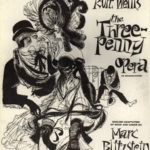 On March 10, 1954, Marc Blitzstein’s adaptation of The Threepenny Opera opened at New York’s Theatre de Lys (now Lucille Lortel). Its unprecedented success helped to launch the Off-Broadway movement. The musical’s journey began in 1927, with Elizabeth Hauptmann’s translation of John Gay’s The Beggar’s Opera. When producer Ernst Josef Aufricht was looking for shows to launch his new company at Berlin’s Theater am Schiffbauerdamm, Bertolt Brecht proposed Hauptmann’s work. Kurt Weill wrote a new score, using only one melody by Johann Christoph Pepusch from Gay’s work, and The Threepenny Opera premiered Aug. 31, 1928. Rudolf Forster (Macheath), Carola Neher (Polly), and Lotte Lenya (Jenny) reprised their stage roles for the 1931 German film. Below is Lenya singing “Seeräuberjenny” in the film.
On March 10, 1954, Marc Blitzstein’s adaptation of The Threepenny Opera opened at New York’s Theatre de Lys (now Lucille Lortel). Its unprecedented success helped to launch the Off-Broadway movement. The musical’s journey began in 1927, with Elizabeth Hauptmann’s translation of John Gay’s The Beggar’s Opera. When producer Ernst Josef Aufricht was looking for shows to launch his new company at Berlin’s Theater am Schiffbauerdamm, Bertolt Brecht proposed Hauptmann’s work. Kurt Weill wrote a new score, using only one melody by Johann Christoph Pepusch from Gay’s work, and The Threepenny Opera premiered Aug. 31, 1928. Rudolf Forster (Macheath), Carola Neher (Polly), and Lotte Lenya (Jenny) reprised their stage roles for the 1931 German film. Below is Lenya singing “Seeräuberjenny” in the film.
The first American production, adapted by Gifford Cochran and Jerrold Krimsky, opened April 13, 1933, on Broadway, featuring Robert Chisholm (Macheath), Steffi Duna (Polly), and Marjorie Dille (Jenny). It closed after 12 performances, and the show wasn’t revived until Blitzstein’s 1954 adaptation, which ran for 2,707 performances and became the only Off-Broadway show to receive Tony nominations, which included Scott Merrill (Macheath) and Lotte Lenya (Jenny), who won. Producers Carmen Capalbo and Stanley Chase also won a special Tony Award. The remaining cast included Jo Sullivan (Polly Peachum), Leon Lishner (Mr. Peachum), Charlotte Rae (Mrs. Peachum), Bea Arthur (Lucy), and Gerald Price (Streetsinger). Below is Lenya recreating “Pirate Jenny” for a U.S. TV special.
In 1956, Louis Armstrong had a Top 40 hit with the show’s “Mack the Knife,” but the song is most closely associated with Bobby Darin, whose 1959 version reached the top of Billboard’s Hot 100, spending nine weeks at #1, and earned the singer Grammy Awards for Record of the Year and for Best New Artist. In 2016, the Library of Congress inducted both Armstrong’s and Darin’s versions into the National Recording Registry. Below is Darin on the May 31, 1959, episode of The Ed Sullivan Show.
In 1956, the show premiered in London with Bill Owen (Macheath), Daphne Anderson (Polly), and Maria Remusat (Jenny), followed by revivals on Broadway in 1966 with Per Nielsen (Macheath) and Ellika Linden (Polly / Jenny) and on the West End in 1972 with Joe Melia (Macheath), Vanessa Redgrave (Polly), and Annie Ross (Jenny). New adaptations of the show appeared in the late 1970s, beginning with a translation by Ralph Manheim and John Willett for the 1976 Broadway revival starring Raul Julia (Macheath), Caroline Kava (Polly), and Ellen Greene (Jenny).
In the 1980s, there was Robert David MacDonald’s 1986 National Theatre version with Tim Curry (Macheath), Sally Dexter (Polly), and Eve Adam (Jenny) as well as Michael Feingold’s 1989 Broadway version with Sting (Macheath), Maureen McGovern (Polly), and Suzzanne Douglas (Jenny). Raul Julia recreated his role of Macheath for Mack the Knife, Menahem Golan’s 1989 film adaptation. Below are clips of Sting singing “The Ballad of Living in Style” and Julia performing “Tango Ballad.”
https://youtu.be/T8CaAiU4fz8
Donmar Warehouse presented a 1994 production of MacDonald’s version, which received an Olivier nomination for best revival, with Tom Hollander (Macheath), Sharon Small (Polly), and Tar Hugo (Jenny). More recent English-language versions include Wallace Shawn’s 2006 adaptation for Broadway, which received a Tony nomination for best revival, with Alan Cumming (Macheath), Nellie McKay (Polly), and Cyndi Lauper (Jenny) as well as Simon Stephens’ 2016 revision for the National, which received an Olivier nomination for best revival, with Rory Kinnear (Macheath), Rosalie Craig (Polly), and Sharon Small (Jenny). Below are Cumming and Lauper singing “The Ballad of the Pimp” at the 2006 Tonys and George Ikediashi singing “Mack the Knife” in 2016.
https://youtu.be/avuBkiIpemg
